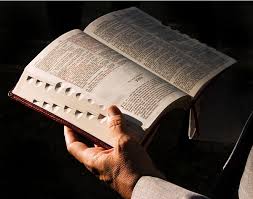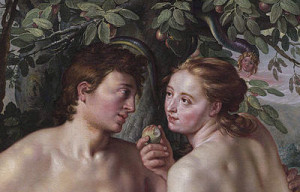A preaching on Genesis 3 by John Nelson Darby

After covering the basics of the gospel, Darby said that sin must be put away perfectly. The sinner brought back to God must be spotless. Christ did not enter heaven again until He had settled the whole question of our sins and of sin itself. The moment I, as a poor sinner, look by faith to Jesus as my divine sin-bearer, all my sins are gone – they are put out of God’s sight for ever. I am pardoned through His blood, peace having been made through the blood of the cross. And the glorified Man is in heaven, appearing in the presence of God for us – of His Father and our Father, of His God and our God. No sin there
Man has a Conscience
Man is by nature a ruined sinner, shut out by sin from the presence of God with no way back in his present state. The last Adam brings us back, not to an earthly paradise, but into the very presence of God in heaven. God does not bring a sinner back to innocence, but to the “righteousness of God”. The believer is “made the righteousness of God in him.” (2 Cor. 5:21)
Man has a conscience – he knows good and evil. Even if a godless man steals, his consciences tells him that he has done wrong.
Now look at Satan’s temptation. He wanted to make God’s creatures think that God had been keeping something that would be for their good back from them – that He was jealous of their becoming as Himself. Satan’s great lie was, “Ye shall not surely die.” (v.4) It is his constant aim to make men believe that the consequence of sin will not be all that God has said it would be.
The Woman’s Sin
The woman listened to Satan; she lusted. Her heart was away from God, so she followed her own way – just like men do now, trying to make themselves comfortable away from God. Would you to meet God just as you are? God would say ‘Come and be judged’. So you would hide from God, as Adam and Eve did. Not only did they hide themselves from God, they hid themselves from themselves and from one another: the covering of the fig-leaves was just to hide the shame of their nakedness. And when they were hiding away from God, they were away from the only source of blessing. The light had come in and they wanted to get as far from it as possible.
Let us look at the character of their sin. They believed that the devil had told the truth, and that God did not. Satan wanted them to think that God was keeping from them the very best thing they could possibly have. And men are still believing the devil’s lie – hoping to get into heaven their own way, when God has said that nothing defiled shall enter in. Men are looking to Satan for happiness, instead of believing God. They cannot believe that God wants to make him happy.
Now I may say, ‘I have done very little wrong.’ But I am still making God a liar. All Adam did was to eat an apple. What harm was there in eating an apple? Alas! Adam and Eve cast off God, and that was the harm. Whether it was eating an apple, or killing a man, as Cain did later, the principle was the same. It was casting aside God’s authority, and making Him a liar.
Adam hides himself from God. He wanted to get out of His presence? But the God of love brings the knowledge of the harm into man’s conscience. He does that in love, for if He were dealing with men in judgment He would have left them under it.
God called to Adam. When God speaks, it awakes the conscience; but this is not conversion. God speaks to show man to himself, and bring him back to blessing. His conscience is awakened and that brings him back to the presence of God. You would not hide from a policeman if you have done nothing wrong. But you try to hide yourself from God, because you have done what you know He hates, and that separates you from Him. Man cannot bear to meet God. Innocence, once gone, can never be restored.
The Effect of Sin
Sin has made man get away from God, and it has forced God to drive him from His presence. Man is out of paradise: toil, suffering, sorrow, sickness and death tell us that. And there is only one way back to God, and that is through the Second Man. Christ comes in by the door into the sheepfold, so there is no getting in some other way. He is the door, and whoever enters must come by Him. The flaming sword shut every other avenue to the tree of life. There was no possibility of creeping up to it by some unguarded path.
We also try to excuse ourselves. Adam laid the blame on the woman. “The woman whom thou gavest me, etc.” (v.12) It was as much as saying, ‘Why did you give me this woman? It was your gift caused the sin’. But Adam is condemned by the very excuse. “Because thou hast hearkened etc.” (v.17). Our excuses become our condemnation.
God does not comfort Adam or his wife. He shows man his sin to convict his conscience, not to make him happy. If my child has been naughty, do I wish him to be happy about it? No, I want to forgive him, but he must first feel his sin. God must have us see that we have sinned against Him. We justify God in condemning us. To see sin as God sees it is repentance. It is “truth in the inward parts.” It is holiness and truth in the heart.
God’s Way
God did not leave these poor condemned sinners without comfort. He said to the serpent, “The seed of the woman shall bruise thy head.” It was a new thing that God was bringing in – a new person and a new way. Christ was ‘the seed’. Blessing would come by the Seed of the woman through whom the curse had entered. This was perfection of grace. If sin had come in, sin had to be put away entirely. He who shut man out from heaven has fully provided that which shall shut him in again. We brought back to God through the precious blood of Christ. Christ loved us and gave Himself for us. That is God’s grace.
” God commends his love to us, in that, we being still sinners, Christ has died for us.” (Rom. 5:8 Darby) We do not want a good Adam, – but a great God and Saviour. In the cross of the Lord Jesus Christ, see all the wrath of God for sin was laid upon Jesus.
Sin must be put away perfectly. The sinner brought back to God must be spotless. Christ did not enter heaven again until He had accomplished this. “When he had by himself purged our sins, he sat down,” (Heb 1:3). When all was finished, He took the throne of righteousness. Adam was cast out of the earthly paradise; Christ, as the last Adam, is in the heavenly paradise.
God justifies me when He says, ‘My Son has been given for your soul, and died for sin’. I am clothed with Christ; I am become the righteousness of God. What more could I have or want? I do not know Him fully, but He has redeemed me; and I am in Him that is the life. He is in me, and I in Him; and where He is, there I shall be in due time. I am still in the body, and bear about with me the bondage of corruption; but Satan’s power is crushed. The serpent’s head is bruised. He has been overcome: Christ went down under the full power of him that had the power of death; and He came up from it triumphant, for it was not possible He should be held by death.
He has overcome
We are told, “Resist the devil, and he will flee from you.” (James 4:7). We are not to overcome him (we could never do that), but when he meets Christ in me, he cannot stand that, he must flee.
The Lord Jesus Christ came down from heaven in love, devoted Himself to God for our salvation. He drank the cup of wrath for sin; He tasted death, shut out from God’s presence that He might bring us back into the presence of God without judgment and without sin. This makes us happy and blessed for ever. He knew what the holiness of God was, and what His wrath was; and therefore He knew what He was delivering us from. How I shall hate sin, if I have seen Christ agonising for mine upon the cross! This changes my heart.
The moment I, as a poor sinner, look by faith to Jesus as my divine sin-bearer, all my sins are gone – they are put out of God’s sight for ever. Christ is in heaven – He could not take my sin there. I am pardoned through His blood, peace having been made through the blood of the cross. And the glorified Man is in heaven, appearing in the presence of God for us – of His Father and our Father, of His God and our God.



